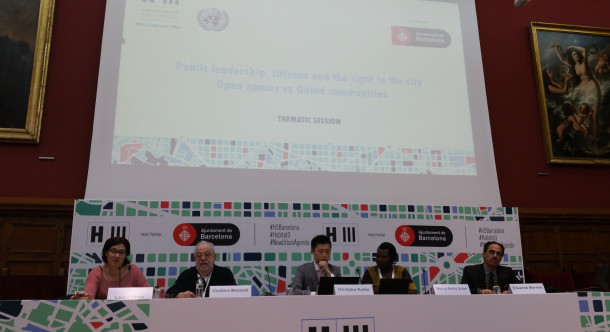 Metropolis General Secretariat
Metropolis General Secretariat
The right to the city and to public spaces forces us to look towards diversity
Last Monday and Tuesday, Metropolis Women International Network participated at the Habitat III Thematic Conference on Public Spaces organized by UN Habitat and Barcelona City Council. In the framework of this event, the President of Metropolis Women, Laura Pérez Castaño, moderated the thematic session entitled “Public leadership, citizens and the right to the city. Open spaces vs Gated communities” which was attended by 80 representatives of the civil society, international organizations, academia, students, private sector, etc. During the debate, special focus was on the role of the local dimension, including all stakeholders, to guarantee the citizenship rights and the sustainable development in our cities. Furthermore, it was vindicated a feminist discourse and a greater gender mainstreaming in the conception and elaboration of urban and metropolitan policies; policies that must place people, understanding their diversity, at the center.
Main conclusions arising from the session:
The right to the city forces us to look towards diversity (cycle of life, origin, income, culture, etc.) and to stop thinking of citizens as simple monoliths.
- The right to the city and the right to housing are inseparable and are at the heart of evolution.
- The rights to the city, to habitat and to housing must be guaranteed (not only declaring their need and importance), and not by subordinating these rights to financing and private sector.
- Gated communities, which on occasion result in a drastic increase of age and gender-segregation, are not a solution to urban conflicts but ignorance of causes.
- The shape of cities conspires against human rights: in the last 20 years, cities have grown three times compared to the increase of urban population. This phenomenon has caused less compact cities and a reduced access to basic public services.
- National policies do not address realities and dynamics of cities, which have been developed more unevenly than the States themselves.
On the other hand, the Presidency and the Coordination of the Network took advantage of these days of work to hold meetings and establish contacts with other entities and organizations: Gender Hub de ONU Habitat, Women in Cities International, UN Major Group for Children and Youth, Huairou Commission, Human Rights and Citizenship Department of Sao Paulo, etc.
See the Declaration of Barcelona.
Visit the official website of the event: www.habitat3.org/Barcelona

